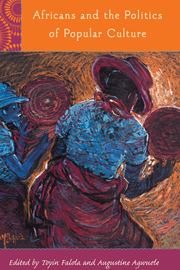Book contents
- Frontmatter
- Contents
- List of Illustrations
- Preface
- Introduction
- 1 From Primitive to Popular Culture: Why Kant Never Made It to Africa
- Part One Politics of Culture in Habitual Customs and Practices
- 2 Popular Culture of Yoruba Kinship Practices
- 3 Justice from Below: Cultural Capital, Local/Global Identity Processes, and Social Change in Eastern Niger
- 4 Popular Culture and the Resolution of Boundary Disputes in the Bamenda Grasslands of Cameroon
- 5 Reverse Mission or Asylum Christianity? A Nigerian Church in Europe
- 6 Performing Pop Tradition in Nigeria: From Yorùbá Bàtá to Bàtá Fújì
- Part Two Politics of Culture in Popular Representations: Films and Performances
- Part Three Politics of Culture in Popular Texts
- List of Contributors
- Index
- Rochester Studies in African History and the Diaspora
2 - Popular Culture of Yoruba Kinship Practices
from Part One - Politics of Culture in Habitual Customs and Practices
Published online by Cambridge University Press: 12 September 2012
- Frontmatter
- Contents
- List of Illustrations
- Preface
- Introduction
- 1 From Primitive to Popular Culture: Why Kant Never Made It to Africa
- Part One Politics of Culture in Habitual Customs and Practices
- 2 Popular Culture of Yoruba Kinship Practices
- 3 Justice from Below: Cultural Capital, Local/Global Identity Processes, and Social Change in Eastern Niger
- 4 Popular Culture and the Resolution of Boundary Disputes in the Bamenda Grasslands of Cameroon
- 5 Reverse Mission or Asylum Christianity? A Nigerian Church in Europe
- 6 Performing Pop Tradition in Nigeria: From Yorùbá Bàtá to Bàtá Fújì
- Part Two Politics of Culture in Popular Representations: Films and Performances
- Part Three Politics of Culture in Popular Texts
- List of Contributors
- Index
- Rochester Studies in African History and the Diaspora
Summary
Introduction
The quest to understand human behavior has remained one of the enduring tenets of anthropological inquiry. In studying the customs and habits of people, understanding the growth and spread of ways of solving perennial problems is one intention, especially gaining insight into the wealth of thoughts that underlie such practices. Thinking along the line explored by Stuart Hall, it is extremely difficult to explain complex social processes through one narrow approach, no matter how powerful, especially to explain emblematic narratives that yield predictable outcomes. Nonetheless, the Yoruba kinship system as indexed by its nomenclature provides a useful means for contemplating the popular practices associated with it.
Several aspects of the Yoruba kinship system have received extensive attention in literature. In discussing Yoruba kinship practices, Nathaniel Fadipe, Solomon Oyetade, and William Schwab included bòdá/bùròdá and àní in their list of Yoruba kinship nomenclature. These terms, borrowed from the English language, were phonologically and morphologically adapted to conform to the syllabic structure of the Yoruba language and were semantically modified to index established cultural and social principles. Elusive, however, in the scholarly discourse of Yoruba kinship terms—indigenous and borrowed—are the motivations for their sociocultural genesis, clear elucidation of the principles that determine and constrain their usage, and the fulcrum of the importance of kinship and kin terms in the regulation of interpersonal and communal relationships among Yoruba people. The present chapter attempts to fill this gap.
- Type
- Chapter
- Information
- Africans and the Politics of Popular Culture , pp. 41 - 63Publisher: Boydell & BrewerPrint publication year: 2009

